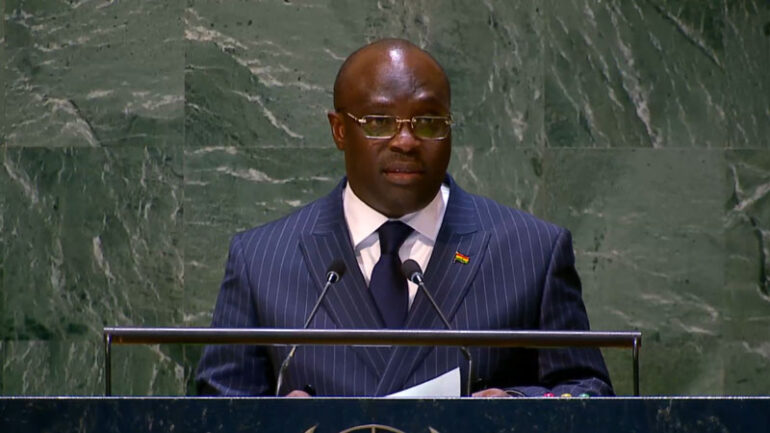Remarks at United Nations General Assembly 78th plenary meeting, 78th session

Ambassador Harold Agyeman
Ghana’s Representative
to the United Nations
May 06 2024
GENERAL ASSEMBLY DEBATE ON THE USE OF THE VETO IN RESPECT OF A DRAFT UNSC RESOLUTION ON WEAPONS OF MASS DESTRUCTION IN OUTER SPACE
Mr. President,
Ghana regrets that the Security Council could not find the will to reflect in a consensual manner its views on contemporary issues relating to Outer Space, for which 115 Member States have agreed a treaty to govern its exploration and use.
We are particularly distressed because since 1967 the broad agreement reached on the question of outer space has been that placing nuclear weapons or weapons of mass destruction in outer space is banned and that the establishment of military bases or installations, as well as the testing of any type of weapons or the conduct of military exercises on the moon and other celestial bodies is prohibited.
The fact that the Council could not express the international legal position and principles on outer space evenly gives much cause for concern, especially in relation to the activities of States with major space capabilities that also pursue efforts at military superiority and dominance.
In this regard, it is Ghana’s view that as the Council proceeds with such concerns, it should do so with our common aspiration in mind and the inherent interest of all humanity to prevent the installation of nuclear weapons or WMDs or the testing of any military weapon or the conduct of military exercises in outer space.
The Council’s engagements on outer space should therefore strive for balanced and comprehensive reflections that can promote universal commitments to peace, security, and cooperation among all nations, mindful of the complexities of modern space activities.
To be clear, outer space should never be an arena for militarization, whether in testing weapons, in conducting military exercises or in installing nuclear or other weapons of mass destruction. Ghana reiterates that being the province of our common humanity, outer space should not be explored or used in a manner inconsistent with our avowed commitment to peaceful purposes.
Indeed, outer space is not subject to national appropriation and sovereignty and it is Ghana’s view that ownership over and management of military assets should perforce only be exercised in national jurisdictions. Under no circumstances therefore should some States contemplate a superior right to the shared commons of our humanity and proceed in a direction that could jeopardise peace and security for all.
Ghana therefore rejects all notions that justify the militarization and weaponisation of outer space and will condemn any verifiable incident of violation by any State party of its binding obligations on Outer Space. We urge increased transparency and the rebuilding of trust among major space nations to consolidate the common aspiration of humanity for the peaceful uses of outer space.
Our common and unified efforts should be devoted to the deployment of space resources for enhancing civilian wellbeing, including through communication systems, global navigation, monitoring and early warning mechanisms, and the many other useful purposes to which space technology can be put.
We believe also that there is a need to strengthen the current legal framework, enhance international cooperation, and develop norms and regulations to prevent the potential for conflicts in space through real or perceived threats of military imbalances. We must reinvigorate our efforts under the relevant agenda item of the Conference on Disarmament.
I conclude by urging a holistic approach to addressing peace in outer space, within the appropriate universal forum and in a manner that can enhance peace, security, and cooperation for the benefit of all nations.
I thank you.
